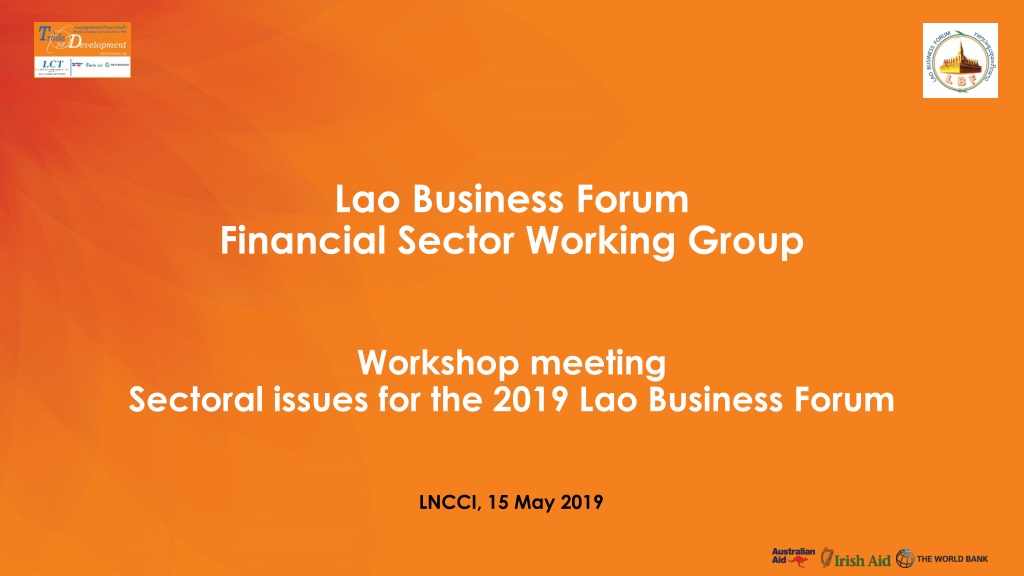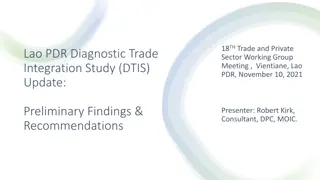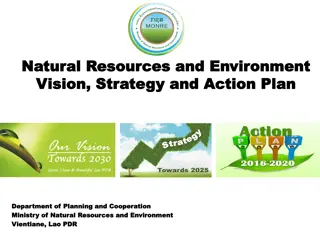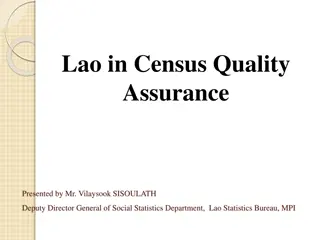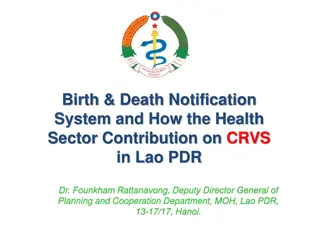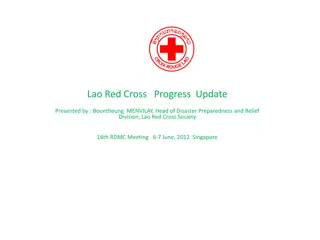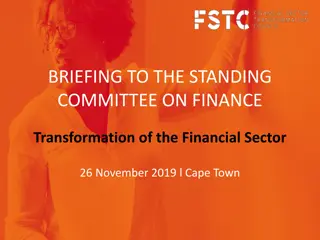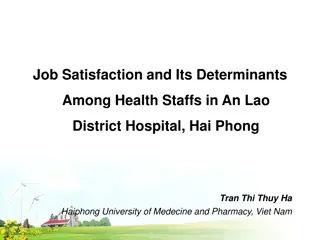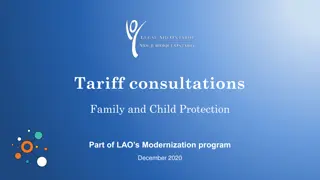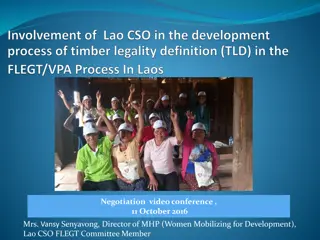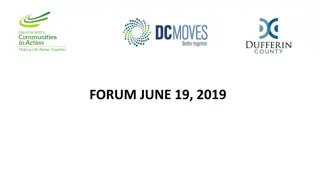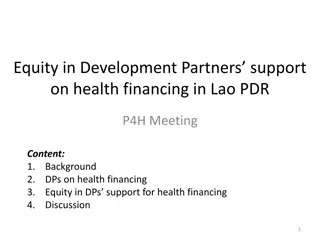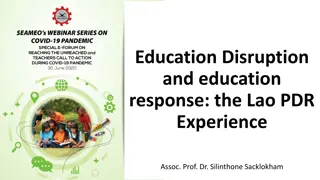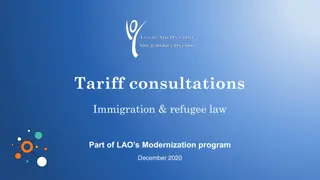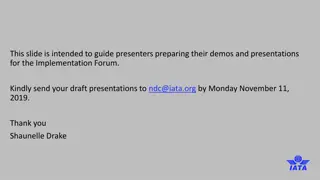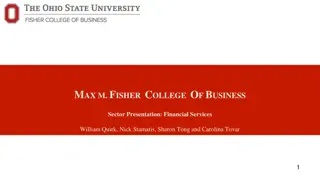Update on Financial Sector Working Group Issues for 2019 Lao Business Forum
The Lao Business Forum (LBF) held a workshop meeting to discuss sectoral issues and gather feedback from members. The workshop agenda included presentations on key issues such as foreign currency lending, credit information sharing, and reserve requirements. Updates were provided on resolved issues like interest rate caps. The working group discussed policies on credit information sharing and registration of credit documentation for upcoming activities. The LBF aims to ensure consistent enforcement of laws, remove business obstacles, and provide feedback on government regulations. The next LBF is scheduled for October 2019.
Download Presentation

Please find below an Image/Link to download the presentation.
The content on the website is provided AS IS for your information and personal use only. It may not be sold, licensed, or shared on other websites without obtaining consent from the author. Download presentation by click this link. If you encounter any issues during the download, it is possible that the publisher has removed the file from their server.
E N D
Presentation Transcript
Lao Business Forum Financial Sector Working Group Workshop meeting Sectoral issues for the 2019 Lao Business Forum LNCCI, 15 May 2019
Welcome and workhop agenda Workshop objective: obtain working group members feedback on sectoral issues and agree on next steps Agenda Presented by Time 8:30-8:45 9:00-9:15 9:15-9:45 9:45-10:15 10:15-10:30 10:30-11:00 11:00-11:40 11:40-12:00 Opening remarks Ms. Valy Vetsaphong, Vice President of LNCCI Update on working group issues LBF Secretariat Presentation key issue 1 Rob Kaanen, Project Consultant Roundtable discussion All participants Break Presentation key issue 2 Rob Kaanen, Project Consultant Roundtable discussion All participants Wrap-up and closing remarks Ms. Valy Vetsaphong, Vice President of LNCCI 2 www .t4dlaos.org
Introduction The Lao Business Forum (LBF) is a platform for public private sector dialogue, aimed at Ensuring consistent enforcement and interpretation of laws Removing impediments to business Providing feedback on Government laws and regulations The LBF receives technical support from the Lao Competitiveness and Trade (LCT) project and its secretariat is maintained by the LNCCI The LBF is organized at four levels Private sector working groups where policy ideas are discussed and formulated Public private sector consultation meetings A Steering Committee to review progress and agree on key forum inputs An annual forum meeting to inform about achievements and unresolved issues The next LBF will take place in October 2019 3 www .t4dlaos.org
Update on financial sector working group issues (1) Issues raised at the previous working group meeting on . 1. Foreign currency lending and FX conversion 2. Credit information sharing 3. Reserve requirements 4. Leasing in LAK 5. Deductibility of VAT 6. Double taxation of reinsurance 7. National payment system + Lack of benchmark interest rates for longer maturities Issues were further investigated during interview round April May Interest rate caps issue considered resolved as repealed through Agreement 140/BoL of 12 February 2019 4 www .t4dlaos.org
Update on financial sector working group issues (2) Based on .. Policy notes prepared on two key issues Credit information sharing Registration of credit documentation and loan security agreements Next steps for working group in lead up to business forum: 1. Aaaa 2. Bbbb 3. Cccc 5 www .t4dlaos.org
Key issues presentation and discussion Credit information sharing Registration of credit documentation and loan security agreements 6 www .t4dlaos.org
Information sharing has a positive impact on credit conditions and a credit registry has been operating in Lao since 2012 Public and private credit registries exist to improve the information available on borrowing firms and individuals Credit information sharing can allow lenders to extend greater credit at more favourable interest rates The Credit Information Center (CIC) was established in 2012 under the Bank of Lao and financial sector membership is compulsory The CIC scores quite well in the World Bank s annual Doing Business Report on depth of information coverage CIC includes both firms and individuals Positive and negative credit data covered Online access Contains more than two years of historical data However, at 14.5% of the population, the coverage of firms and individuals is below the East Asia & Pacific region average 7 www .t4dlaos.org
As a public credit registry, the CIC has been improving its services, but Lao does not have a fully fledged credit bureau Studies have shown that credit bureaus have a greater impact on improving the credit environment than a public credit registry, especially for smaller firms* Credit bureaus can lower lenders operational cost and improve profitability A credit bureau would offer value added services, such as Credit scoring Reporting services Broader range of information, including data from retailers, utility companies and increasingly alternative data from mobile phone and social media Over the years, the CIC has been expanding its membership by including more leasing companies, MFIs and offering more flexible pricing plans Further improvement plans in the pipeline Include utility provider data and links to Government databases CIC will become a separate legal entity over the next 6 months Plans for the selection and procurement of a new IT platform 8 * = IFC presentation on global credit reporting program (2015). Credit Reporting and Financing Constraints. World Bank Policy Research Working Paper (2003) www .t4dlaos.org
The sector raised concerns before about the the information coverage and quality of customer credit information provided by the CIC The issue was raised before at the 2017 Lao Business Forum In a survey conducted last year by the CIC Almost half responded that the information provided by CIC is insufficient Two-third said that the CIC information does not meet business requirements Information coverage is seen as too limited Retail and utility provider data not included CIC not linked to other Government databases Data quality issues, caused by Monthly refresh and manual data upload, prone to errors and delays Limited data validation performed by CIC and cross-referencing other databases Limited enforcement of the membership rules on obligation to provide accurate data 9 * = CIC membership survey where a total of 16 financial institutions provided survey responses www .t4dlaos.org
The CICs service offering is seen as too limited to respond to the needs of the industry Limited search capability and reporting Database search through manual query, but no system to system interface Automated set of standard reports does not exist Lack of value added services, such as Credit scoring and credit trend reports Bespoke reporting of sectoral data Historical evolution of credit grades (A/B/C) 10 www .t4dlaos.org
For discussion: Improvements to be requested from the public sector Implementation planning of CIC upgrades for improved information coverage and data referencing Better enforcement of accurate reporting standards by the Bank of Laos supervision departments Regular membership dialogue to update the membership on new developments through newsletters and communication sessions The sector should be consulted on the business requirements for the new IT platform Involvement of the user community in business requirements gathering through process-, documentation- and data analysis, workshops, focus groups and membership surveys User community representatives included in project governance over business requirements validation, approval and sign-off Participation in the vendor selection workshops, prototyping, pilots and user acceptance testing Consultation on data migration planning and system conversion 11 www .t4dlaos.org
Key issues presentation and discussion Credit information sharing Registration of credit documentation and loan security agreements 12 www .t4dlaos.org
Secured lending is very common and formal registration requirements are imposed by the Law and the Bank of Laos Land titles are the most readily available collateral Official land titles ( golden border ) are registered the Land Management Division of the Ministry of Natural Resources and Environment Urban areas 70-80% covered, but in rural areas only 20-30% But sporadic land title registration not affordable for the rural population Bank of Laos placed restriction on use of Village Head certified land titles ( white border ) in November 2017 Loan and security interest agreements need to be notarized* for these to be accepted by the People s Court in case of disputes Security interest agreement needs to be registered** in order to have preferential rights of priority. For immoveable assets with The Division of Land Management of the Ministry of National Resources and Environment, AND State Asset Management Department under the Ministry of Finance * Under Lao Contract Law and the Law on Notary Offices ** Law on Secured Transactions (2005) and the related Decree (2011), and the Decree on Document Registration No. 52/PM of 1993 13 www .t4dlaos.org
The registration process of the loan agreement and security interest is cumbersome and the fees are considered high The registration process involves 6 different steps with 4 different Government bodies The total time to complete the entire process: between 2 and 4 weeks (Not counting any time spent on agreements between the bank and the customer) Total number of Government office visits involved: between 7 and 11 (Some office visits involve regional travel and/or waiting time at the office) Total third-party fees* payable: range of LAK 2 to 4 million (Excluding out-of-pocket expenses, own time, travel costs and bank fees) * The security agreement registration fee charged by the Land Management Office has been subject to discussion at the 10th Lao Business Forum in 2017, where it was proposed to cap these fees at a maximum level of LAK 1,000,000 per loan item. A proposal along these lines has been submitted by the Ministry of Justice to the National Assembly for consideration and promulgation through Presidential Decree. 14 www .t4dlaos.org
Formal requirements present an unnecessary high burden on the lending process restricting access to finance Lack of substance or added value of certain steps Notary Office stamping, when checks and verifications of agreement correctness, encumbrances or Court proceedings are not performed, while authentication has already been performed by the Village Head Registration (perfection) of security interest over immoveable asset at both the Land Management Office and the Department of State Asset Management Lack of transparency of fees Difficult to know in advance what level of fees are involved, as payment of express fees may be required Regional variations in fees Online consultation of land register and Court judgments not possible Limitations placed on access to finance by only using officially registered land titles 15 www .t4dlaos.org
For discussion: Improvements to be requested from the public sector Process simplification Online service for request for authentication of land title, encumbrances and pending Government land projects Notarization of loan and security agreements should be eliminated and/or performed online Registration of the security interest in immoveable assets at the Department of State Asset Management should be eliminated Standard and published fee scales Fixed amount/capped fees for sets of documents, not based on number of pages or loan amount Where possible, fee payments should be made via bank transfer or accepted at via a Point-of-Sales (POS) terminal only Permission to use Village Head certified land titles for soft collateral lending in areas with low rates of formal land titling under certain circumstances (< amounts, pledging of security interest, authentication by the Village Head and reporting to the CIC) 16 www .t4dlaos.org
Outline of proposal to the public sector Requested next step Addressed to Create online forms and online process to perform query of land title database Online notarization of loan and security agreements Introduce online and digital payment of fees instead of cash eGovernment Department of the Ministry of Post and Telecom and the Land Management Division of the Ministry of Natural Resources and Environment Ministry of Justice Reconsider the notarization requirement of loan and security agreements Adapt the fee schedule for notarization of loan and security agreements Create a central database of Court judgments Unify the fee scales across the country for Village Head authentication of loan and security agreements Reconsider the requirement to register loan and security agreements over immoveable assets at the Department of State Asset Management Issue clarification in relation to Notice 818/BoL, that pledging of Village Head authenticated land titles is allowed under specific circumstances Ministry of Home Affairs Ministry of Finance Bank of Laos 17 www .t4dlaos.org
Wrap-up and next steps Summary of workshop conclusions Agreed next steps 18 www .t4dlaos.org
